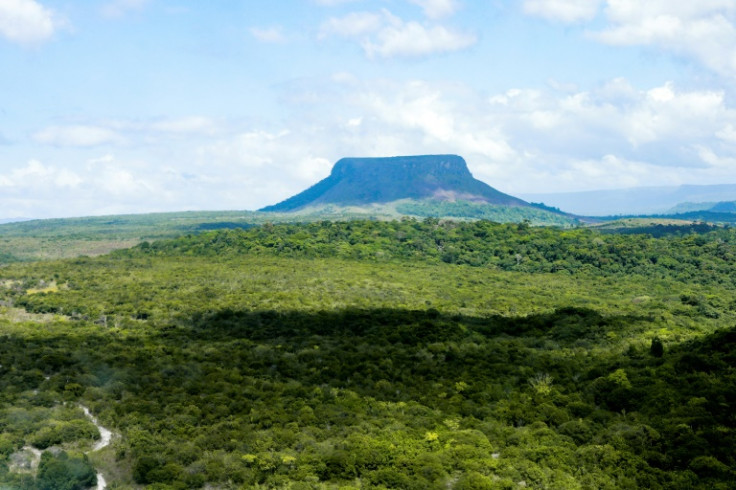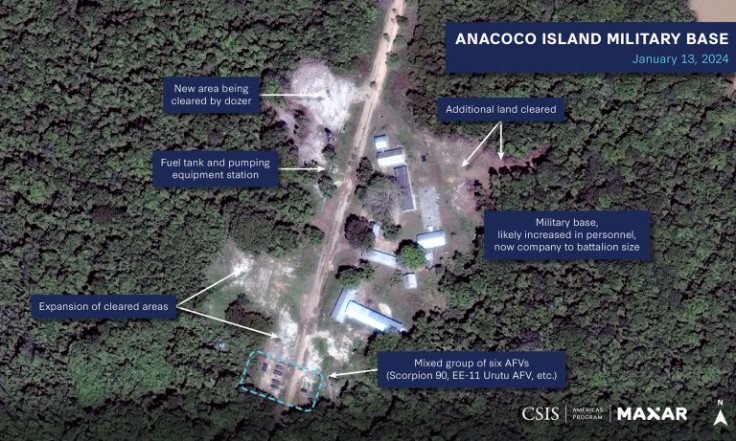
The presidents of Venezuela and Guyana, Nicolás Maduro and Irfaan Ali, reached an agreement in December to denounce the use of force in the countries' dispute over the Essequibo, an oil-rich region controlled by Guyana that Venezuela claims as its own. They also met in late January and tensions seemed to drop after a peak reached in December, following a controversial referendum where the Venezuelan population approved the creation of a province in the Essequibo.
However, recent actions by the Maduro government show it has increased its military presence in the area, moving light tanks, missile-equipped patrol boats and armored carriers to the border. Moreover, it vowed a "forceful response" if oil drilling begins in contested waters.
New satellite images revealed on Friday by Venezuela on social media shows the increased its military presence on Anacoco Island, a disputed territory with historical tensions, leading up to the January meeting in Brasilia.
A report by the Center for Strategic and International Studies said that the Venezuelan military's intentional information operation targeted external audiences, including the Guyanese government, raising concerns about the sincerity of Venezuela's commitment to diplomatic resolution.
Recent military deployments, including missile boats and surface-to-air systems, near the Essequibo border have further escalated tensions. This has prompted the Lloyd's Market Association to designate Guyana's offshore sector as an area of elevated risk, impacting the cost of shipping crude oil and posing potential threats to the nation's booming oil industry. The Venezuelan military's actions indicate an attempt to compel Guyana to negotiate bilaterally and potentially gain favorable terms, CSIS added.

International responses suggest growing concerns about Venezuela's actions. Brazil reinforced its forces in Boa Vista, and the United States pledged to deepen defense cooperation with Guyana. These moves indicate a recognition of potential threats and a commitment to safeguarding Guyana's borders.
This week, the Biden administration said it will help Guyana buy new aircraft, helicopters, military drones and radar technology, this last one being a first.
U.S. deputy national security advisor, Jon Finer, and Western Hemisphere senior director Juan González, met with Guyanian officials the day before the agreement was announced.
"That cooperation is fundamentally defensive in nature and grounded in our desire for Guyana to be able to defend its territorial integrity against any possible threats," Finer told reporters late Sunday.
In another passage of the report, CSIS warned that Venezuela's behavior raises the risk of miscalculation and loss of control, given internal divisions within the Venezuelan state. The buildup on Anacoco may be an attempt to appease factions within the military frustrated with diplomatic negotiations. However, this poses risks of local commanders escalating tensions independently, leading to further provocations or even military operations in the disputed territory, the think tank added.
Venezuelan Defense Minister Vladimir Padrino wrote on X this week that Venezuela would carry out a "forceful response" if U.S. oil giant ExxonMobil starts drilling in contested waters. He said that while ExxonMobil may have the protection of the United States and Guyana, "in the maritime space that rightfully belongs to Venezuela, they will receive a proportional, forceful response that adheres to the law."
As the March meeting between Presidents Maduro and Ali approaches, CSIS recommends policymakers remain vigilant. Anacoco Island, Punta Barima, and other key locations should be closely monitored to assess ongoing developments, and the international community, including the United States and Brazil, are set to play a crucial role in raising awareness about Venezuela's actions and ensuring that coercive tactics find no acceptance, it concludes.
© 2024 Latin Times. All rights reserved. Do not reproduce without permission.







